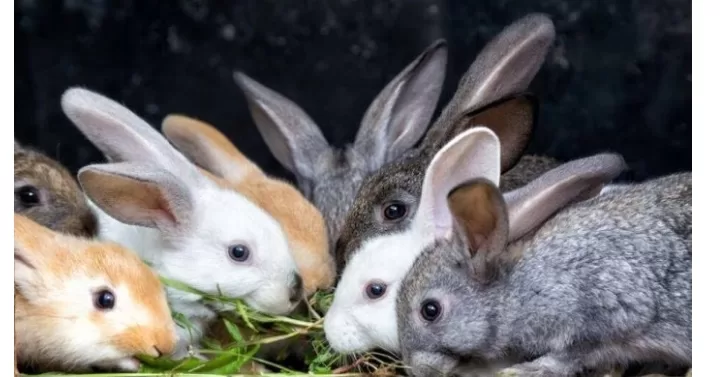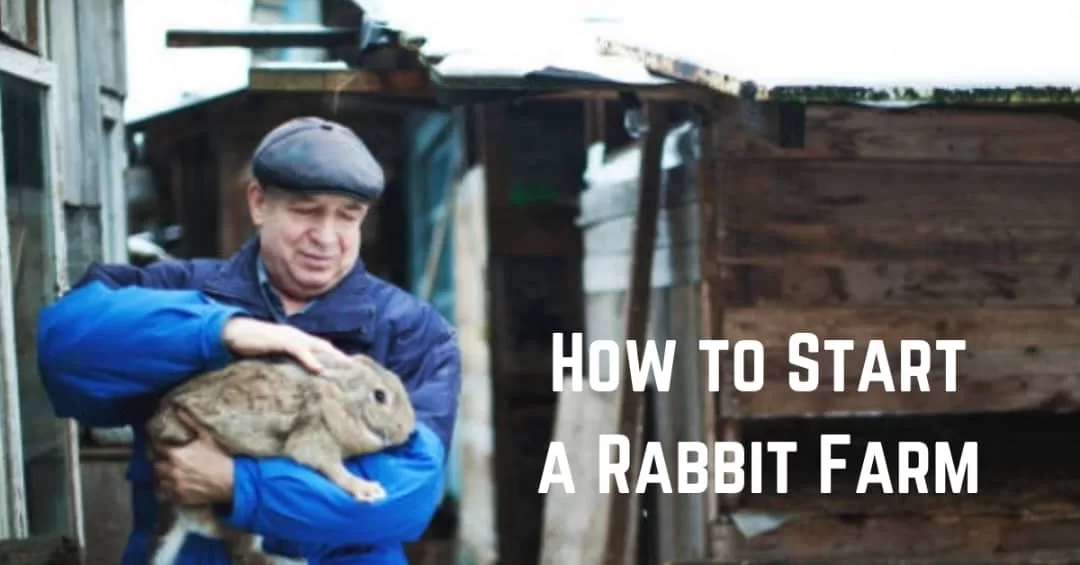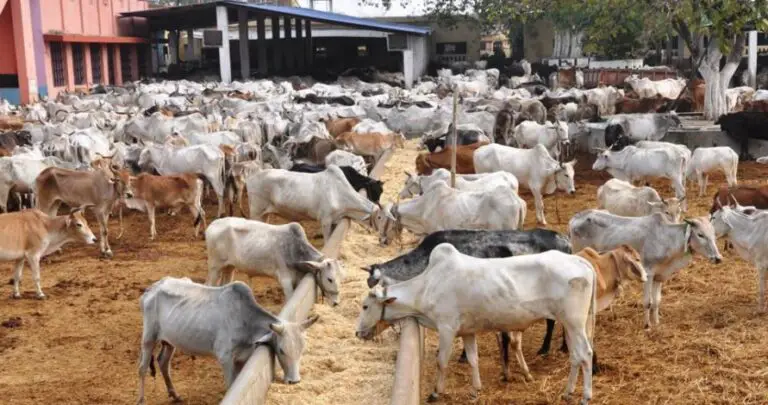How to Start a Rabbit Farm
Most farmers and ranchers have seen how to start a rabbit farm as difficult. To them, it is a non-feasible aspect of animal husbandry. Many have gone too far by purchasing rabbits to raise and make income, just like others. But, all (kits, kittens, or kitties) died within a twinkle of an eye. So sad!
Many have been asking this question: “How to start a rabbit farm?” If you are among these farmers, don’t panic. This article is for you. Before the end of the article, you will be able to know how to start a rabbit farm, why you should start a rabbit farming business, popular farming breeds, and many other related information.
As an expert, rabbit farming is easy and profitable if done correctly. Starting a rabbit farm is not about buying different rabbit breeds, neglecting the necessary steps to successful rabbit farming. No! You must create a business plan, raise capital, plus other precept-by-precept guides listed in this article.
I can remember many years ago when I was new in cuniculture (acts of farming and breeding domestic rabbits). As a farmer who needed to earn a living through rabbit farming, I planned and prepared carefully.
In summary, after learning the nitty-gritty in rabbit farming, my rabbits have been a source of income. I have made profits through their meat, fur, and other by-products. You see, rabbit farming is a growing and lucrative venture.
What is a Rabbit Farm?
A rabbit farm, also known as cuniculture, raises or breeds rabbits for meat production, fur farming, manure production, or breeding for pet sales. It is a type of animal husbandry ideal for small-scale farmers. Why? It requires minimal investment and space. With little or no capital, you can start a small-scale rabbit farm.
Rabbits are environment-friendly animals. They survive in places where they have access to food, water, and shelter. They are housed in cages or hutches to curb disease and harmful attacks. Rabbit farming can be a sustainable and profitable business due to the high demand for rabbit products and the relatively low cost of operation compared to other livestock.

Is Rabbit Farming Profitable?
The shortest answer is yes. Rabbit farming is a lucrative and viable business venture. Remember that one of the beneficial reasons for rabbit farming is that they have a high reproductive rate. As a farmer, you can raise rabbits for their meat, fur, and manure. With all these products and other by-products, you will earn a lot of money.
Is rabbit farming a Difficult business venture?
No. Rabbit Farming is not tricky. But you have to make proper plans and give your rabbits adequate attention. While raising domesticated rabbits, you don’t need a lot of land space or costly equipment. On the contrary, they don’t depend on a balanced diet. They feed on every good diet. Once they live in a clean and comfortable environment, plus regular veterinary care, your rabbits will always grow fast and reproduce more of their kind.
Read Also: HOW TO SETUP BACKYARD TURKEY FARMING
Why Farm Rabbits?
Rabbit farming is a beneficial type requiring low or no capital. If you need to know more reasons to start up your own rabbit farm business, don’t look further.
Below are five (5) reasons you should consider rabbit farming as a very profitable and sustainable venture:
- High Demand
- Fast Reproductive Rate
- Low Investment Requirements
- Rapid Growth Rate
- Small Space Requirements
High Demand
Rabbit farming is becoming so demanding due to the excessive need for rabbit meat. Rabbit meat has high nutritional value and low-fat content, which is very good for the human body. In addition, rabbits are also crucial to those in fashion and design. The more rabbits reproduce, the more fur is produced. Even for farmers, rabbits also serve as manure. For all these reasons, rabbit farming will never cease to be in high demand.
High Reproductive Rate
Another profitable reason you should venture into rabbit farming is its high reproductive rate. In a few months after birth, they are sexually mature, unlike other livestock like cows and pigs. Since they are induced ovulators, their gestation period lasts between 28 to 31 days, thereby allowing mother rabbits to get pregnant again after a few minutes of giving birth. Mother Rabbits, arguably, can produce one litter in a month if they meet a male rabbit. This rapid reproduction rate allows farmers to quickly build up their herd and generate a steady meat supply.
Low Investment Requirements
Starting a rabbit farm does not require much investment and capital. With little space and resources, you can create a successful rabbit farming business. You can not compare rabbit farming to pig or cow farming. This is because they require much more investment than rabbits. Rabbits and their environment and upkeep (feeding and treatment) are also affordable. They consume less feed per unit of weight than other animals. This makes them a cost-effective option for small-scale farmers looking to diversify their operations.
Rapid Growth Rate
Rabbits overgrow. So, as a farmer, starting a rabbit farming business will yield more profit. Rabbits reach market weight in just 8-12 weeks. You don’t have to wait for months before you sell your rabbits. Once you are feeding them often, treat them properly, and keep them in an air-ventilated hutch, they (rabbit) will grow very fast. This allows farmers to turn over their stock more frequently and generate a higher return on investment.
Small Space Requirement
The beneficial reasons for rabbit farming will not be complete if the small space requirement is not included. Generally, rabbits require little space. You don’t need to spend much money securing an ample space for them to live. This makes them an ideal option for small-scale farmers or those with small land space.
Factors to Consider When Starting a Rabbit Farm
Before you begin a Rabbit Farm, there are some factors you should consider. These factors will help you keep the requirements before starting your business.
They are as follows:
- Right Breed of Rabbit
- Permit or License from the Government
- Suitable Location
- Comfortable hutch or Cage
- Clean Water
- Proper Feeding Method
Right Breed of Rabbit
The first factor to consider before venturing into rabbit farming is to select the right Breed of Rabbit. Do you want to make a profit from rabbit farming? Purchase the right breed of rabbit. To ease the process, research the market demand for specific species and select those that will generate the highest profit.
When choosing the right breed of rabbit, remember to consider if they yield more meat, grow fast, and have growth efficiency. New Zealand White, Californian, Flemish Giant, etc, are the best and most popular breeds for meat production. To produce fur-farming rabbits, you can go for breeds like Rex and European rabbits.
Permit or License from the Government
After purchasing the right breed of rabbits, the next factor to consider is obtaining a permit or license from the government. Since rabbits are an environment-friendly animal, the government must be aware to avoid issues.
You must check with your local government to determine the permits and licenses required to operate a rabbit farm. This may include a business license, zoning permits, and animal welfare certifications.
Suitable Location
You want to start rabbit farming. Do you have a suitable location? Arguably, place is one of the factors to consider when starting a rabbit farm. Ensure that you keep your rabbits in an area with proper ventilation, drainage, and access to water and electricity. When you get a location, check out if it is accessible to potential buyers, transportation routes, and availability of labor.
Comfortable hutch or Cage
The production of your rabbit is directly proportional to how comfortable their hutch or Cage is. Let the rabbits have enough space, comfortable bedding, and proper ventilation to prevent disease and discomfort. Provide separate areas for breeding, nursing, and growing rabbits. Use straw or wood shavings as bedding to absorb moisture and control odors.
Clean Water
One of the essential factors to consider when starting a rabbit farm is clean water. Ensure that you provide clean water in sufficient quantities to prevent dehydration and promote healthy growth. Use a watering system that is easy to clean and maintain.
Proper Feeding Method
Feed the rabbits a balanced diet to promote healthy growth and prevent disease. Use high-quality feed formulated for rabbits and provide all the necessary nutrients. Provide fresh hay or vegetables as a source of fiber to avoid digestive issues.
Table of types of equipment for Rabbit Farming
There are some necessary equipment you need before you start up a rabbit farm.
They include:
| Rabbit Farming Equipment | Uses |
| Nail Clippers | For cutting rabbit nails. |
| Feed Scoop | For safeguarding feed supply. |
| Brushes | For cleaning hutch floors, remove the occasional dried manure droppings that cling to the wire. |
| Wire Cutters, J-clip, and Hog Ring (or C-ring) Pliers. | For building hutches. |
| Bucket and Scrub Brush | For washing and disinfecting hutch floors and feeders, as well as nest boxes. |
| Nest Box Warmer Pad | For covering your rabbits during winter. |
| Rabbit Cages | For housing rabbits and preventing them from escaping. |
| Water Bottles | For providing water to the rabbits. |
| Feeding Troughs | For providing rabbits with a consistent supply of Feed. |
| Heat Lamps | For providing warmth to newborn rabbits during the first few weeks of life. |
| Vaccination Equipments | For administering vaccines to prevent common diseases in rabbits, such as myxomatosis and viral hemorrhagic disease (VHD). |
| Knives | For slaughtering rabbits before cooking. |
| Crates, Cages, or Trailers | For transporting rabbits from the farm to the market. |
| Skinning Machines or Gutting Machines | For preparing rabbit meat for sale or consumption. |
| Hoses | For cleaning the rabbits’ skin. |
How to Start a Rabbit Farm
To start a successful rabbit farm, you must make adequate preparations and do what is required. With the right know-how, cuniculture is simplified.
To help every new rabbit farmer, below are the ten (10) step-by-step guides on how to start a rabbit farm:
- Conduct Market Research
- Develop a Business Plan
- Select a Comfortable Location
- Raise Capital
- Build or Buy a House
- Purchase Equipment
- Buy Rabbits
- Monitor your Rabbits
- Feed your Rabbits
- Market your Rabbits
Conduct Market Research
Before starting a rabbit farm, the first thing you should do is conduct market research. The reason for market research is to find the best-suited rabbit breeds for your climate and market demand. You should also inquire about the costs of equipment, feed, and housing, plus any local laws or permits required for farming rabbits.
Develop a Business Plan
A business plan helps everyone know about their business before execution, making it essential. So, as a farmer who wants to venture into rabbit farming, it is vital that after conducting market research to know the kind of breeds to raise, the next thing is to develop a business plan. When creating a business plan, include the goals and objectives of your farm, the breeds of rabbits, the cost, and your marketing techniques.
Select a Comfortable Location
The next step in how to start a rabbit farm is to select a comfortable site. Select a good location with comfortable space, good drainage, access to water, and plenty of sunlight for your rabbits to live. Make sure the area is calm and not terrifying.
Raise Capital
Raising capital before starting a rabbit farm is very advantageous. The start-up cost depends on the size of the farm, the required equipment, and the total number of rabbits you would like to purchase. If you want to start small-scale rabbit farming, you have to raise capital between ₦200,000 to ₦500,000.
These expenses cover purchasing rabbits, equipment, and erecting or renovating a house for your rabbits. The money is also for feeding, veterinary care, and marketing expenses. You will recover all these expenses with profit if you raise your rabbits properly.
Build or Buy a House
Another thing to do in your preferred location is to build a cage or a hutch for your rabbits. The number of rabbits will determine the required space. Remember not to squeeze them together simply because you are managing space. If you want to start with 100 rabbits, build a house accommodating them.
Purchase Equipment
Rabbit farming equipment is essential to keep in place. Looking at the above table, every piece of equipment is necessary. You must purchase equipment like rabbit hutches or cages, feed scoops, brushes, water bottles, etc. Purchase high-quality equipment to help keep your rabbits healthy and disease-free.
Buy Rabbits
Buy healthy, disease-free rabbits from reputable breeders. The kind of rabbits you purchase at first is the kind of kits they will reproduce. Please make sure they are the breed that is suitable for your climate. Also, consider whether you are raising them for meat, fur, or manure. It will guide you during the purchase. Check out the breeds you want to grow and have been vaccinated against common diseases.
Monitor your Rabbits
After keeping your rabbits in a cage or hutch, always keep your eye on your rabbits. Leaving them there for days without checking on them may be disastrous. They could be sick and need medicine or hungry. Some carnivorous animals might also attack them. So, take proper care of your rabbits.
Regularly check your rabbits for signs of illness or disease, and take appropriate action if necessary. Keep vaccination records and maintain good biosecurity practices to prevent the spread of disease.
Feed your Rabbits
Rabbits need food to grow and be healthy. Feeds help safeguard them from unnecessary infections. Ensure you provide your rabbits with a balanced diet of hay, pellets, and fresh vegetables. Make sure they have access to clean water at all times.
Market your Rabbits
Rabbit farming is a very profitable and sustainable business. Here, you can choose to sell your rabbits alive or the products. Research local demand for rabbit meat, fur, or other products, and develop a marketing strategy that works for your business. Don’t forget to sell your products to potential buyers—for example, local restaurants, grocery stores, and individuals who want to eat rabbits.
Use social media platforms, especially Facebook and Instagram, plus other marketing tools to advertise your products. You can hire a marketer and pay him with some percentage commission depending on the number of sales.
What products does a rabbit produce?
Rabbits are versatile animals. Their products serve many purposes. You can sell them to various markets and make massive income or use them.
Below are eight (8) products rabbits can produce:
- Hides
- Manure
- Meat
- Organs
- Bones
- Fur
- Pelts
- Live rabbits
Frequently Asked Questions on How to Start a Rabbit Farm
Q1: How many rabbits do you need to start a successful rabbit farm?
A1: The number of rabbits depends on your scale of business. But you are expected to start with at least 20 or 30 breeding rabbits. This is to ensure genetic diversity and also a continuous supply of rabbits.
Q2: Which rabbit is best for farming?
A: The best breed of rabbits depends on your purpose of farming. Generally, New Zealand White, Californian, Rex, Flemish Giant, etc, are suitable for Rabbit Farming.
Conclusion on How to Start a Rabbit Farm
Starting a rabbit farm is a great way to turn your animal love into a viable, sustainable, and lucrative business. It is pocket-friendly and environmentally friendly.
It requires low capital for a start, little space, and low maintenance requirements.
In this article, I have shortlisted how to start a rabbit farm, factors to consider when starting a rabbit farm, equipment for a rabbit farm, why to farm rabbits, plus other relevant information.
Take your time and read through to get directions on how to start your own business by raising rabbits. You can drop your question in the comment session for more guidance.
Thank you!








